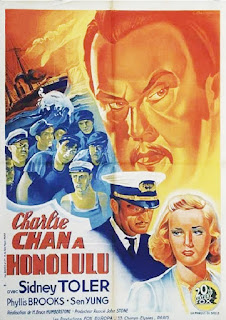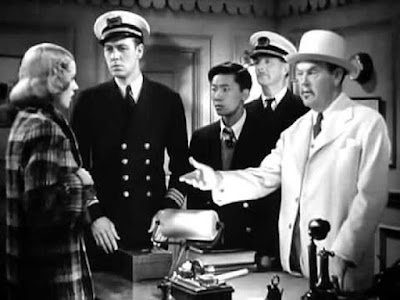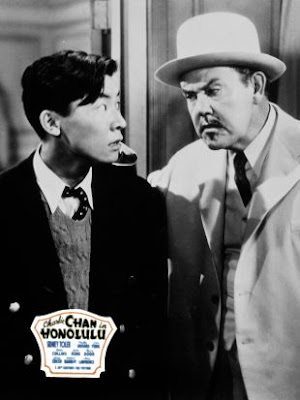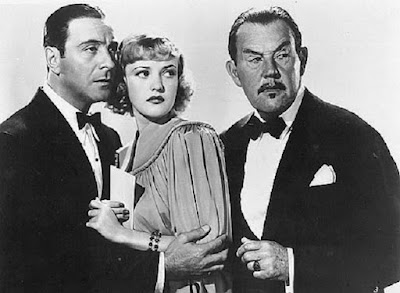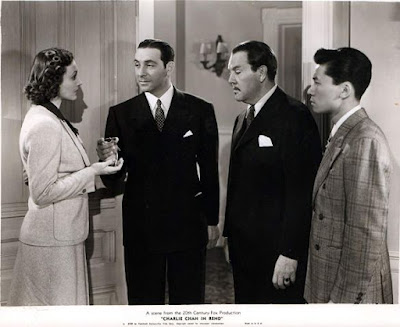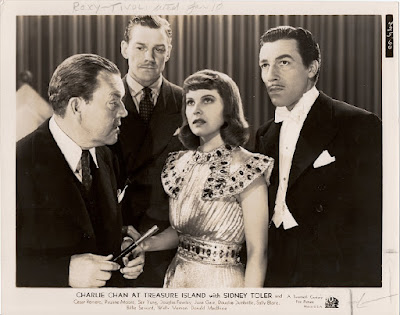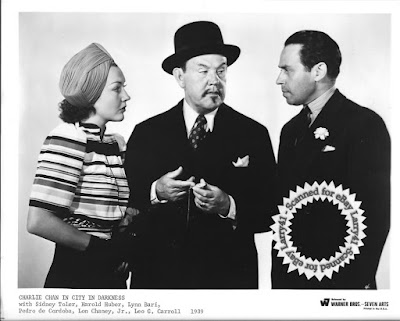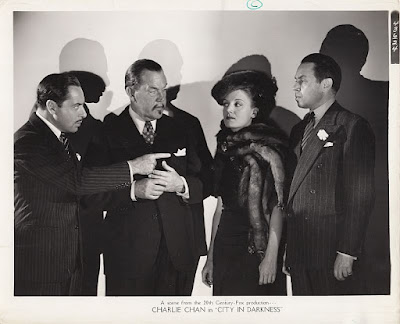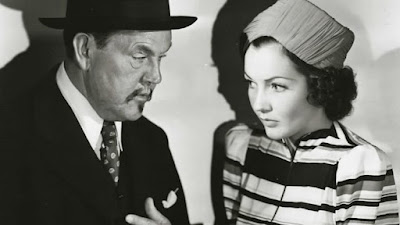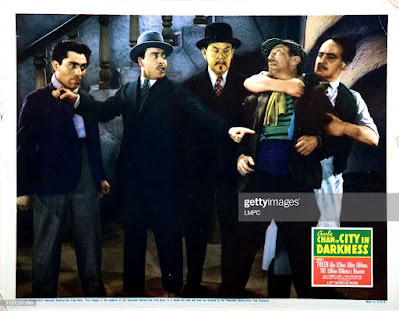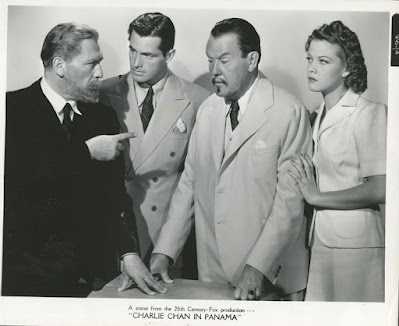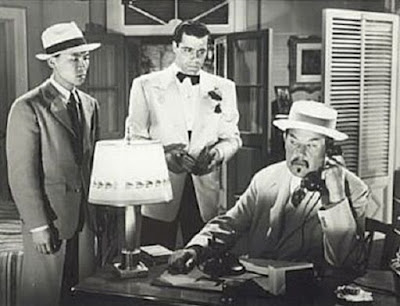Charlie Chan: The
Sidney Toler Era - Films 1 - 5
Charlie Chan in Honolulu (1938) – 6.0
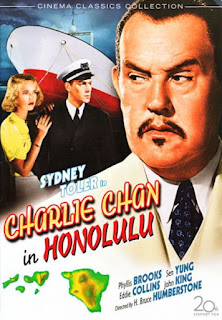
Warner Oland passed away in August 1938. He had been Charlie Chan in sixteen
films and was enormously popular all over the world for that role. His drinking
and the associated damage that did to his body did him in. In his last few
films he had to be held up at times he was so drunk. At one point after Charlie
Chan at Monte Carlo he walked away and said he would do no more Chan films.
But the studio lured him back with a three picture deal. He had begun a film
but he left after a few days of filming and told Fox that he needed a break.
Fox started looking around for a replacement and had even tested Keye Luke
for a series called Son of Charlie Chan. When they received the news that
he had died in his homeland of Sweden the search got serious and the Keye
Luke idea was forgotten. Though we consider the Chan films to be B films they
were very important to Fox - made cheaply and always made a profit.
They tested 34 actors and settled on Sidney Toler who was almost 60 at the
time and a heavy drinker. Filming began in October. Toler had an interesting
background in show business. He had been a successful comic actor on the stage
starring on Broadway and then formed his own theatrical company that toured
the country. He began writing plays for them and produced about 70 of them.
He appeared in his first film in 1929 and by the early 1930s had moved to
Hollywood and was in many films as a character actor. And then he got the
role for Charlie Chan and for the most part only did Chan for the rest of
his career. 22 Chan films and at one point when Fox had had enough he bought
the rights and took Chan to Monogram where the budgets were cut in a third.
Interesting that both Oland and Toler were big drinkers and loved playing
Chan. Toler takes a slightly different slant on Chan - giving him more of
an edge, less patient and at times looks absolutely sinister. Even when he
smiles. Or maybe especially when he smiled.
This first film was directed by H. Bruce Humberstone, who had directed Chan
in three previous films with Oland. Apparently, he was initially unhappy with
Toler's acting - too stiff - and told him to have a few drinks before starting
the day's work. And it seems to have worked. Son Number One, Lee Chan, is
gone from the scripts with a "he is studying art at college" story. In fact,
Keye Luke had decided he didn't want to continue without Oland whom he had
grown very close to over the years. He did have one more appearance as Lee
Chan though. The film they had begun with Oland was turned into a Mr. Moto
film and Lee Chan assists him - this was Mr. Moto's Gamble in 1938. So they
bring on Son Number 2 James Chan played by Victor Sen Young. He was to be
in eleven Chan films that were interrupted for four years when he went into
the military during WW2. During those years he was replaced by Benson Fong.
All three of these sons had lengthy careers in films. Not too common for
Asians in those days and I would guess that the affection they received in
these films had something to do with that.
This one opens in wonderful fashion and introduces us not only to the new
Charlie Chan and Son Number 2 but to nearly the entire Chan family of eleven
children and his wife as they sit around the table eating. James tells pop
that he wants to become a detective and already has cards made out. Chan says
nothing really - just smiles. Then his son-in-law rushes in (played by another
Asian with a long career ahead of him, Philip Ahn) to tell them that his
wife is in the hospital and about to deliver Charlie's first grandchild. Off
he rushes to the hospital and a call comes in from police hq that a murder
has taken place on a freighter and Charlie is needed. Instead James decides
to impersonate his father and have a go at solving it. That does not go well.
Charlie eventually hears about it and boards the boat and the mystery unfolds.
It is a decent mystery with few clues but Charlie pulls out a trick from probably
some other film script. They throw in some silly humor with a lion on the
loose and James who sticks around getting into trouble. The new Charlie was
readily accepted by audiences and he was off to the races and likely the
closest bar. Among the suspects is Claire Dodd who was Della Street in a
few of the Perry Mason films, Richard Lane who plays a cop in all those Boston
Blackie films, George Zucco playing what else but an eccentric scientist carrying
a live brain with him and Marc Lawrence who always seems to be a hood just
like in this one. Not a great film but a decent start for Toler.
Charlie Chan in
Reno (1939) – 7.0
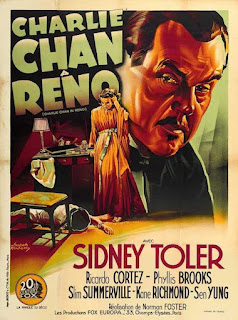
Charlie Chan goes to Reno. No, not for a quickie divorce which with eleven
children would have made sense. But to solve a murder. Quite a tricky one
that I did not see the guilty party coming. This is the second Chan film starring
Sidney Toler and an entertaining one from the beginning to the denouement.
It has a good mix of mystery, comedy and even a touch of romance for Son Number
two. It may actually have too much comedy for some as it comes from three
different sources but it is handled pretty well and is fairly amusing. There
is a very solid group of B actors on hand to bolster a very stiff but just
right performance from Toler. The character actors add the color around him.
It begins in good fashion with Mary Whitman (Pauline Moore) coming to Reno
for a divorce. Her talkative taxi driver is played by Eddie Collins who was
the animal caretaker in Charlie Chan in Honolulu and shows up a few times
to add some humor. He was to die the following year which is a shame as it
would have been nice if he had become a regular in these films. He takes her
to the Sierra Hotel that is full of women waiting for their divorce - the
clerk announces the Alimony Breakfast in the morning. The Hotel Hostess played
by Phyllis Brooks - also in the previous Chan film - says to the hotel doctor
(Ricardo Cortez) - "Another lonely soul. Should I do the bright fun approach
or the sympathetic one". It doesn't much matter when Mary runs into
the woman who is planning to marry her husband. A nasty bit of goods as she
rubs it in. Not too hard to figure out who is going to be dead before the
night is through. Mary is found over the body - seriously if you come across
a dead body don't pick up the murder weapon and don't linger - and she is
arrested.
Back in Honolulu Mary's husband asks Charlie to please go to Reno and find
the real killer. Of course. Anything to get away from his large family. Now
I understand why he is on the road so often for a Honolulu cop. Jimmy - Son
Number 2 - is studying nearby and borrows a car and drives to Reno - stops
for hitchhikers and gets tossed out without his pants. When Charlie sees him
in the police line-up the look on his face is priceless. The two of them get
on the case - Jimmy now in a cowboy hat - with the local sheriff (Slim
Summerville) not too happy to see a Chinese man taking over - why are we
bowing and scraping to him. Hmmm. Charlie just gives him that look and grin
that says you are too stupid to bother with.
A bunch of suspects who all had good reason for murdering the women with
lots of scissors and acid on hand. And Jimmy tackles the dead woman's maid
who turns out to be Choy Wong (Iris Wong) and the two of them try on their
own to solve it. Quite adorable. I wish she was in all the Chan films with
Jimmy - though she does show up in one other as a different character. The
film flies by. Also appearing is Kane Richmond (The Shadow in a few films)
and Morgan Conway (Dick Tracy).
There are a number of Chan aphorisms in this one - "Words cannot cook rice"
and after a lovely woman asks to go with him "Charming company turns lonely
sandwich into a rich banquet". Directed by Norman Foster who did most of the
Mr. Moto films and a few other Chan movies - so mainly B films but he also
directed the excellent Journey into Fear with Orson Welles and Joseph Cotten.
Charley Chan at
Treasure Island (1939) – 5.0

Geez, Charlie Chan can't even take a plane without someone suspiciously
dying on it. He and Son # 2 Jimmy (Victor Sen Yung) are flying from Honolulu
to San Francisco to visit the 1939 World Exposition when a friend turns out
to be dead when they land. Certain messages lead Charlie to investigate a
prominent psychic Dr. Zodiac - whose real identity is unknown. I kind of groaned.
So many B films from that period involved mediums and mind readers and fortune
tellers. So much easier now to do it over the phone or the Internet. What
is a little strange about this one is that usually they are proved to be
fakes but a mind reader turns out to be the real thing and solves the mystery.
Fox must have been getting lobbied by the Psychic and Medium Unions. Who
needs Charlie Chan if this person can read minds?
Charlie is joined in his investigation by a reporter and a rival magician
Rhadini (Cesar Romero) and they discover that Dr. Zodiac is blackmailing lots
of people from information that he received from a web of fellow psychics.
Sidney Toler plays Chan for the third time and after a good start in the first
two films, it slips considerably in this one. It feels very B. It doesn't
make all that much sense, the motive is weak, it seems long at 74 minutes
and Charlie wasn't the one to solve it! On hand also is Donald MacBride
as of course a confused cop, Douglass Dumbrille and his little moustache as
well, Sally Blane as the dead passenger's wife - and also the sister of Loretta
Young - and Pauline Moore as the mind reader who was in a few Roy Rogers
Westerns, a few Charlie Chan films and was Ann Rutledge in Young Mr. Lincoln.
City in Darkness
(1939) – 6.5
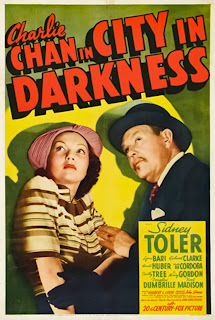
Charlie Chan in City in Darkness is one of the more interesting entries
so far in this series, but my guess is that the script went through various
changes as world events impinged on the story. It is not the mystery itself
that is all that special but the circumstances in which it takes place. Production
was begun in July 1939 and it was released later that year in early December.
The world was going through cataclysmic events with Hitler occupying Czechoslovakia
in 1938, the Munich Agreement in September 1938, Italy invading Albania in
April 1939 and finally Germany invading Poland in September 1939 with England
and France declaring war against Germany a few days later. In May 1940 Germany
invaded France.
Hollywood was basically muted during all of this for two reasons. Profits
and Politics. Germany was a huge film market for Hollywood and in fact Hitler
was a big film fan who watched movies after dinner on most nights at home.
Germany made clear that they would not show Hollywood films that were in any
way critical of Germany or their treatment of the Jewish people and Hollywood
caved in to them. They even erased credits on films that were Jewish. James
Whale (director of Frankenstein) left Universal after they cut his film The
Road Back in 1937 about Germany to appease the Nazi's. This is even made worse
by the fact that most of the Studios were run by Jewish refugees who came
to America for freedom. The book The Collaboration by Ben Urwand delves into
this subject extensively.
Politics also played a role in the meager output from Hollywood critical
of what was happening in Europe. There was a powerful Isolationist lobby headed
by Republican Senator Gerald Nye from North Dakota and Democratic Senator
Burton Wheeler from Montana who chastised the film industry for being anti-German
when Warner Brothers released Confessions of a Nazi Spy in 1939 starring
Edward G. Robinson and George Sanders and directed by Anatole Litvak, a Jewish
refugee from Russia. Nye was to say after this film that Hollywood was “a
raging volcano of war fever”. In the next year Hollywood did release a few
anti-German films such as A Yank in the R.A.F., The Great Dictator, Foreign
Correspondent and two shorts by none other than the Three Stooges called
You Nazty Spy and I’ll Never Heil Again. Sad that the Three Stooges had more
courage than many in Congress, but not surprising.
So this context makes Charlie Chan in the City in Darkness rather remarkable
for its opening, plot and the finale. Think how scared so many Americans are
today from the rhetoric of politicians who live on fear like bacteria in
your intestines. Think about what was going on in Europe and compare it to
ISIS. Imagine walking into a Charlie Chan film in 1939 expecting a nice bit
of fun and mystery and the film begins with a newscast detailing the horrors
going on in Europe. It takes place in Paris as it prepares for invasion and
German agents are up to no good. The film all but plays the La Marseillaise.
It is an invasion that does not come in the film as it has yet to happen in
reality, but Charlie's last words about The Munich Agreement and spiders and
flies makes it clear that he knows war is coming.
The murder itself is about a war profiteer who is selling weapons to be
shipped out of Europe before the borders are sealed. There seem to be a truckload
of suspects who all visited his house on the night of his death. They all
had good reasons. Charlie Chan is in Paris for a reunion of Intelligence agents
who worked together in WWI. And here they are again waiting for the next
one. No son # 2 in this one. He is missed. The atmosphere is well done with
people frantically trying to get out of the country, panic every time a plane
is heard above and at nights the city shrouds itself in darkness. Chan is
unable to leave so he has nothing better to do than pitch in and help the
French police. Here is where the film runs into a ditch.
The cop is played by Harold Huber who had played cops in Charlie Chan on
Broadway and Charlie Chan at Monte Carlo - in those two films he was vaguely
amusing as the policeman who needed help - but here he takes center stage
as a noisy, yelling not very bright cop to the point of distraction. Why did
so many of these B films need to have stupid cops on hand? There is
a solid cast to complement Sidney Toler - Lynn Bari, Dorothy Tree, C. Henry
Gordon - not as a bad guy for a change, Douglass Dumbrille - the same cannot
be said about him, Leo G. Carroll - future head of UNCLE - and Lon Chaney
Jr as a thug who almost kills Charlie.
Charlie Chan in
Panama (1940) – 6.0
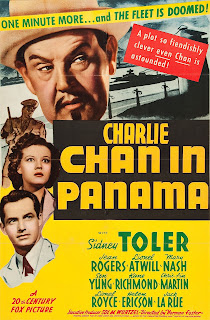
It is still nearly two years before the USA would be drawn into WWII but
the shadow war between the intelligence agencies is well underway and Charlie
Chan (Sidney Toler) is in the middle of it. This is another one of the films
from Hollywood that paints Germany as the villains without ever mentioning
them. You can usually infer it through names such as Reiner, the master spy
in this one. It is often the B films in which this happens with the A films
staying away from politics and offending Germany. In Chan's last film City
of Darkness he was in Paris with the Germans on the verge of invading the
country. In that one Son #2 (Victor Sen Yung) was sadly missing but he is
in the middle of this one; even saving his father's life at one point. Chan
though upon seeing him says "Man without relatives is man without troubles".
It is called the City of Spies - Panama City - the militarily strategic
location of the Panama Canal. And Chan has been set up undercover (till his
son blows his cover) as a seller of hats known only to a few as Charlie Chan.
He appears to be an innocent Chinese man with an aphorism for everything.
Such as "Bad alibi is like dead fish. It can not stand the test of time".
Oddly, my grandfather used a version of that whenever we used to visit him
"Guests are like dead fish. They begin to stink after three days". I wonder
what he meant. Son #2 Jimmy makes his appearance in a Panamanian jail for
taking photos of military installations. He just happened to be going through
as a worker on a cruise line.
A plane load of people disembarks. One of them is Reiner but they have no
idea which one. They know his mission is to blow up the Canal as the US fleet
goes through. The one who may have a clue to his identity dies of a poison
cigarette just as he is about to tell Chan. Cigarettes really are bad for
your health. Everybody on the plane is up to something suspicious. The English
author (Lionel Atwill) who is likely not an English author, the middle aged
female teacher (Mary Nash - Philadelphia Story), the pretty woman and cabaret
singer who escaped from Eastern Europe (Jean Rogers from Flash Gordon), the
Arab with a fez (Frank Puglia), the owner of the cabaret (Jack La Rue, a bad
guy in a ton of films) or the Doctor with a thick German accent who has rats
with bubonic plague in his laboratory. As they start getting killed the list
gets shorter. Not too bad. I am getting more used to Toler as Chan - a little
darker than Warner Oland played him. At the end the fleet goes through and
Charlie says to Jimmy "With strong military peace will prevail". So not a
fortune teller.
